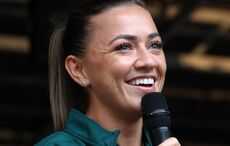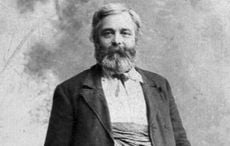Irish Micky Ward, 46, is the legendary boxer whose real life tale inspired the Academy Award winning film The Fighter starring Mark Wahlberg.
But as we all know real life isn’t like the movies, even when it sticks close to the original facts. So Ward has just released his own memoir, A Warrior’s Heart: The True Story of Life Before and Beyond the Fighter (Berkley) that’s every bit as captivating and well told, but this time it’s his story in his own words about what happened to him before and after the film.
As his fans know, Ward is the former American junior welterweight professional boxer and former Word Boxing Union (WBU) champion who hails from the hardscrabble Irish American working class town of Lowell in Massachusetts.
Ward’s real life title bout against Shea Neary was the climax of The Fighter, winning him the coveted WBU title, but he participated in many other legendary bouts before and after that have ensured his legend will endure.
How did Ward do it? A Warrior’s Heart makes clear luck and the right temperament were involved, but there were also two other early and enduring influences on his life that defined him.
The first major influence was his often terrifying (and terrifyingly loyal) Irish American family. The second was his hero worship of his older half-brother Dicky, who he loved and admired in about equal measure.
There’s a crucial difference between a fighter and a boxer, Ward writes. The fighter is born, not made. You’re either blessed with the courage to get the better of your fear or your not. And if you’re not you’re probably going to spend a lot of time getting knocked on your butt.
In contrast a boxer is a tactician and an athlete, he writes, a man who spends hours in the gym perfecting his skills. A boxer, Ward claims, is made, not born.
But luckily for Ward, he was one of those rare individuals who could combine both qualities in the ring. That was what took him all the way to the top.
It was Dicky who took his younger brother to the gym for the first time, where the older boy was already becoming a boxing prodigy. The two kids with the comically rhyming names both had more talent that they knew what to do with, and figuring out what to do with it would be the work of a lifetime.
Dicky, for all his skill in the ring, was a mess in his personal life, with private demons he exorcised by abusing crack until it quickly got the better of him. In the process his best years were wasted, torn off, unused, flying by him so fast that he almost didn’t see them.
The Fighter begins at the end of Dicky’s decade long freefall in the abyss of drugs, when he had finally become the local kid who almost – but not quite – made it out of Lowell. But all those dreams got lost along the way, and what was left was a drug addicted shell of a man, who coulda shoulda woulda, a clichéd tough guy that nobody listened to anymore.
Ward doesn’t make any excuses for his older brother’s behavior in his new book, but he does point out that conflict and disappointment and broken dreams and anger were all he ever witnessed growing up.
Who could be surprised if he couldn’t see his own way out of them? Despite his crazed circumstances Dicky still had heart, he still loved his family, he still looked out for his guys.
Drinking almost ruined Ward’s family on a near daily basis. The day would begin happily enough but by early evening, once enough booze had been consumed, snarky criticism became open conflict and people beat the hell out of each other.
Then the next day all the dysfunction from the day before would be forgotten, then it would start all over again. It was a crazy life, but it was all he had ever known.
No wonder the two of them loved boxing. Boxing offered hope to kids stuck in hopeless circumstances.
It kept you off the streets and out of trouble. If you did well your community started rooting for you. They didn’t take notice you any other way.
Although The Fighter spends most of its time exploring Dicky’s inner demons, as Ward’s new book makes clear for the first time he had a few secrets of his own too.
From about the age of about nine a young man who was a family friend 10 years older began sexually abusing him. It became a regular thing and it troubled him.
When he was 15 he met the man in the boxing ring and he later confronted him about what had happened. He could have taken the man’s head off, he realized, but that could have led to a prison sentence for him that would have meant his abuser had won, he said.
That kind of self-discipline is hard won, but he had it. The one thing that has defined Ward’s life in the ring and out of it more than anything else was his refusal to ever give up. He just wouldn’t do it.
In fight after fight he stood his ground and went back in, even – and perhaps especially – when everyone else was telling him to stop. Ward defied the one thing that ends boxing careers faster than anything – fatigue in the ring.
He swears he doesn’t know where that refusal comes from, but it’s not hard to imagine the years spent watching his brother almost rise to the top, only to have his dreams all cruelly snatched away, didn’t strengthen his resolve never to let it happen to him too.
Nowadays, after all the hype has died down and the Oscar parties have ended, Ward insists he has no regrets. He got to spend most of his life doing what he loved, boxing.
He admits he didn’t make the major billfolds of other ring stars like Mike Tyson or Oscar De La Hoya, but he did find firm financial stability and he did become the only Irish Catholic lad from Lowell to end up having a big Hollywood movie made about him. That’s not bad going at all compared to how his story could have ended.
Now Ward works in construction and for Teamsters Local 25 as a driver. There are side effects to his long career in the sweet science that give him pause, like the double vision he gets if he looks up too quickly.
He is, he also reveals in his new book, a candidate for pugilistic dementia. But he’s philosophical about it.
In fact he sounds like a man completely and unexpectedly at peace. Perhaps it’s because he has already made his arrangements for what will happen to him when he shuffles off to glory.
The scientists of Boston University will inherit his brain and spinal column, which they will certainly research to study the effects of a lifetime pursuing the sport he loves.
Here's some footage of Micky Ward in action:
Here's the trailer for Mark Walhberg's Oscar-winning movie about Mickey Ward:




Comments